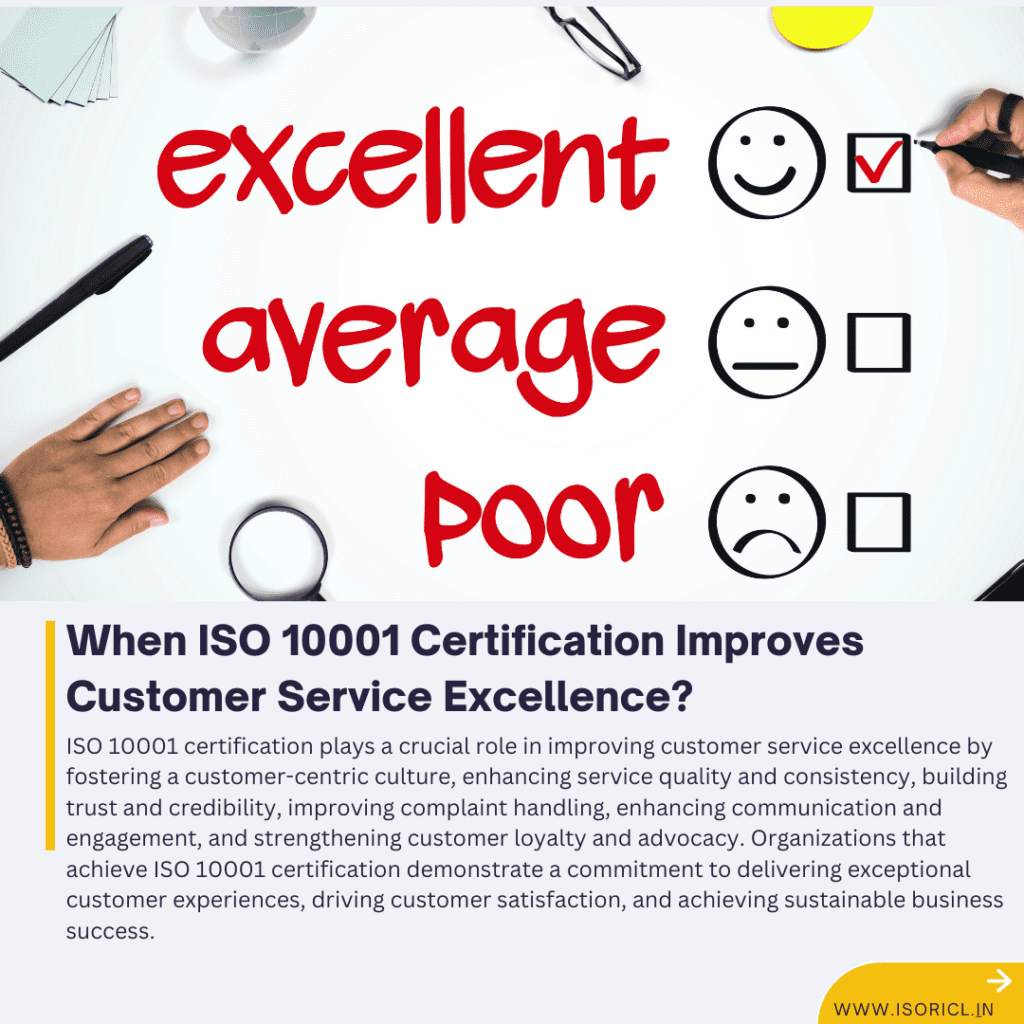When ISO 10001 Certification improves customer service excellence ?

ISO 10001 is a guideline standard that provides principles and guidelines for organizations to implement a customer satisfaction management system. While it does not provide certification like other ISO standards, it offers valuable principles that can enhance customer service excellence. Here’s how ISO 10001 can contribute to improving customer service excellence:
- Customer-Centric Approach
- Customer Satisfaction Management: ISO 10001 emphasizes the importance of understanding customer needs, expectations, and satisfaction levels. Organizations develop processes to gather customer feedback, analyze data, and respond to customer concerns effectively.
- Customer Relationship Management: Implementing ISO 10001 encourages organizations to build long-term relationships with customers based on trust, transparency, and responsiveness to customer feedback and preferences.
- Enhanced Communication and Transparency
- Information Management: ISO 10001 guides organizations in communicating effectively with customers about products, services, pricing, and terms. Clear and transparent communication builds trust and reduces misunderstandings or disputes.
- Complaint Handling: Establishes processes for receiving, handling, and resolving customer complaints promptly and fairly. Organizations use complaints as opportunities for improvement and customer service enhancement.
- Continuous Improvement
- Quality Improvement: ISO 10001 promotes a culture of continuous improvement in customer service. Organizations monitor customer satisfaction metrics, identify areas for improvement, and implement corrective actions to enhance service delivery.
- Employee Training: Provides training to employees on customer service principles, complaint handling procedures, and conflict resolution techniques. Well-trained staff can deliver consistent and high-quality customer service experiences.
- Building Customer Loyalty and Trust
- Customer Loyalty Programs: Organizations develop loyalty programs and incentives to reward repeat customers and encourage customer retention. ISO 10001 supports strategies for building customer loyalty through personalized service and value-added benefits.
- Trust and Confidence: By adhering to ISO 10001 guidelines, organizations demonstrate their commitment to customer satisfaction and ethical business practices. This builds trust, confidence, and loyalty among customers and stakeholders.
- Operational Efficiency and Effectiveness
- Process Standardization: Standardizes customer service processes, procedures, and workflows to ensure consistency and efficiency in service delivery. This reduces errors, delays, and customer dissatisfaction due to inconsistent service experiences.
- Performance Measurement: Implements performance metrics and key performance indicators (KPIs) to monitor customer service performance. Data-driven insights help organizations assess service quality, identify trends, and make data-driven decisions.
- Market Differentiation and Competitiveness
- Brand Reputation: Organizations that adhere to ISO 10001 principles enhance their reputation as customer-focused and service-oriented entities. Positive brand perception attracts new customers and strengthens relationships with existing ones.
- Competitive Advantage: Differentiates organizations in the marketplace by providing superior customer service experiences compared to competitors. ISO 10001 encourages organizations to innovate and exceed customer expectations.
Conclusion
ISO 10001 Certification, though it does not provide certification itself, improves customer service excellence by guiding organizations to adopt customer-centric practices, enhance communication and transparency, foster continuous improvement, build customer loyalty and trust, optimize operational efficiency, and differentiate themselves in competitive markets. By implementing ISO 10001 principles, organizations can elevate their customer service standards, strengthen customer relationships, and achieve sustainable business growth through enhanced customer satisfaction and loyalty.

ISO 22000
Food Safety Management System

HACCP
Hazard Analysis and Critical Control Points

FSSC 22000
Food Safety Management Certification Scheme

ISO 22301
Business Continuity Management Systems

ISO 13485
Quality Management For Medical Device

ISO/IEC 27001
Information Security Management System

ISO 20000-1
Information Technology Service Management

ISO 42001
Artificial Intelligence Management System

ISO 41001
Facility Management System

ISO 21001
Educational Organizations Management System

IATF 16949
Quality Management For Automotive

TL 9000
Quality Management System for Telecom

AS 9100
Quality Management for Aerospace Industry

ISO 30000
Ship Recycling Management System

ISO 55001
Asset Management System





